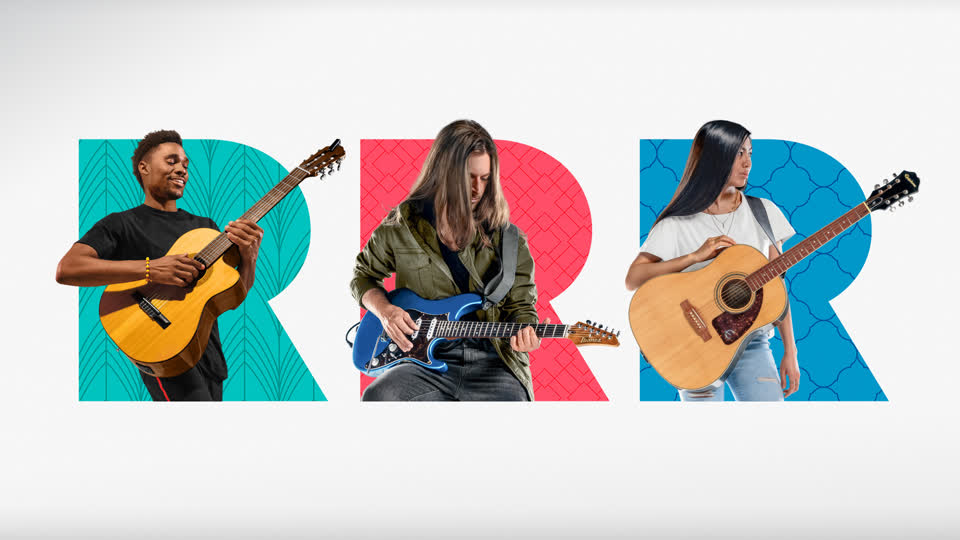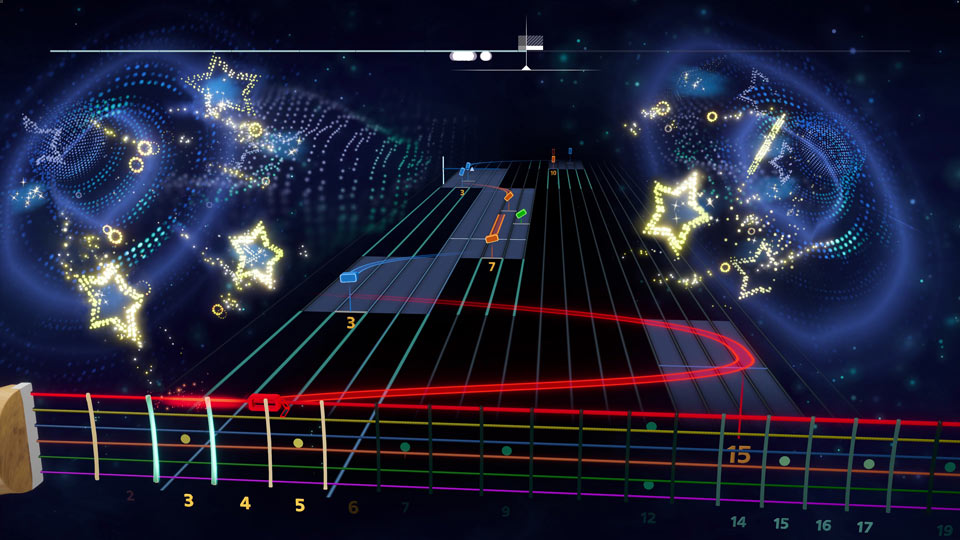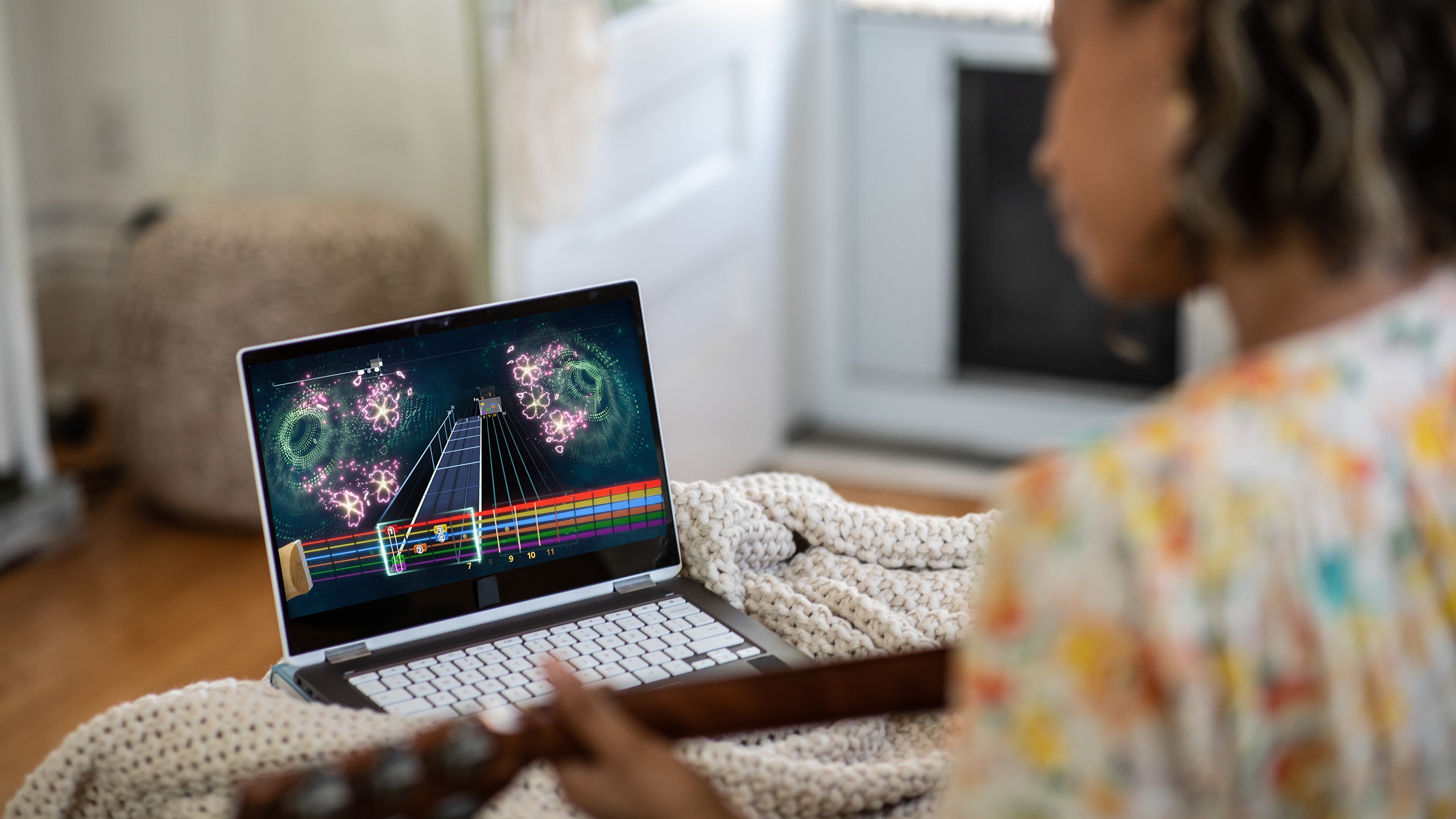Throughout human history Art and Music have always been intrinsically connected. During the production of Rocksmith+, I was amazed to discover the unexpected ways in which that connection has surfaced. In fact, the fundamental secret of perspective was demystified thanks in part to a representation of a Lute on an Albrecht Dürer woodcut from 1525.
![[RS+] News Article - Dev Diary for July 2022 - Albrecht Durer](http://staticctf.ubisoft.com/J3yJr34U2pZ2Ieem48Dwy9uqj5PNUQTn/2UK1jQ5mwd8O64zo4hmsWh/6132c5477d7334cd2f3c70f44ca65e3a/AlbrechtDurer_960x540.jpg)
The advent of 3D modeling software and digital instruments has brought about further opportunities for Music and Art to evolve from its analog roots. With Rocksmith+, our talented team strives to bridge the fascinating worlds of Music and Art through our new unlockable rewards.
Our first step as game developers was to create a foundation/template that we could use to explore instrument customization options. To do this, we created a 2D template based on headstocks and fretboards.
![[RS+] News Article - Dev Diary for July 2022 - headstock swappableu](http://staticctf.ubisoft.com/J3yJr34U2pZ2Ieem48Dwy9uqj5PNUQTn/30p0ZyUdaJSJ85jn2AIDnk/d9191212dcee32744c334f9da59d0ced/headstockSwappable__-960_540.gif)
Since the Tuner and Noteway prominently features the head and neck of the instrument, those two parts became our primary visual focus.
![[RS+] News Article - Dev Diary for July 2022 - frog headstock](http://staticctf.ubisoft.com/J3yJr34U2pZ2Ieem48Dwy9uqj5PNUQTn/28zaPtnzgrDXhkj3NrWuee/721f5a7a1aecf27a25cae9a0e9701159/frogHeadstock_960_540.gif)
This allowed us to start creating unique concept art to explore both true-to-life models and fantastical designs to give players fun and diverse customization options in our ecosystem.
![[RS+] News Article - Dev Diary for July 2022 - headstock tuner](http://staticctf.ubisoft.com/J3yJr34U2pZ2Ieem48Dwy9uqj5PNUQTn/FKokIJz9KMwaJ3tmCYNn2/bf76d5b9a177e50b937e1a4d4d9fd7ef/HeadstockTuner.jpg)
Beyond the choice of headstock, players will have the opportunity to further customize their gear with different tuning keys, fretboards, and inlays. These parts are swappable for a unique and personal visual experience.
![[RS+] News Article - Dev Diary for July 2022 - lefty tuner](http://staticctf.ubisoft.com/J3yJr34U2pZ2Ieem48Dwy9uqj5PNUQTn/3BJroCC6R4gJXUpXz3bUXp/fb2325bb3cccb6b1524dd577619a575f/LeftyTuner.jpg)
We also offer dynamic lighting and adapted camera angles for both left-and right-handed players as well as for standard and inverted string modes.
Here at Ubisoft Osaka, we led the art production using the Snowdrop engine to create the art assets and visual world of Rocksmith+.
![[RS+] News Article - Dev Diary for July 2022 - Headstock Evolution](http://staticctf.ubisoft.com/J3yJr34U2pZ2Ieem48Dwy9uqj5PNUQTn/6H46cW7dRyXZqmL9vXawcf/f7129bc7aa2eaaba180dd4ce96efd719/HeadstockEvolution.jpg)
Our multi-disciplinary artists tackled every step of the production pipeline from creating 2D digital concepts to sculpting 3D models or recreating real-world guitars from blueprints.
But creating the model isn't the final step. Our team has also created a variety of wraps, materials, and interesting shaders that allow you to further customize the parts of your instrument. As part of that we've been privileged to work with several of our renowned instrument partners to recreate the striking finishes of their iconic guitars.
![[RS+] News Article - Dev Diary for July 2022 - Pearloid Shader](http://staticctf.ubisoft.com/J3yJr34U2pZ2Ieem48Dwy9uqj5PNUQTn/9PxqSXVBFGNK5u2fYiI4N/1ad7513e2d8f76d17c79bb6eca33ebb9/PearloidShader.jpg)
Our pearloid shader is an example of a common, yet immediately recognizable material which is often used in the instrument world. It's just one of many new shaders that we've created.
![[RS+] News Article - Dev Diary for July 2022 - Pearloid showcase](http://staticctf.ubisoft.com/J3yJr34U2pZ2Ieem48Dwy9uqj5PNUQTn/4pcGlCHQ25YDizx1YwSfuN/212682ce4c087a9813036aa1dd4b4477/Pearloid_showcase_960x540.gif)
Each month we will provide a diversified palette of instruments, nameplates and visual background effects for customizing the Noteway.
![[RS+] News Article - Dev Diary for July 2022 - Rewards Track](http://staticctf.ubisoft.com/J3yJr34U2pZ2Ieem48Dwy9uqj5PNUQTn/3LaWb561z518dDLwFjGU5t/cc734b48ef60ba23cc3b392fe9f41c8e/RewardsTrack.png)
These will be unlocked through our Rewards Track; a free progression system that's part of your subscription. Whether you're playing songs, taking lessons, or spending time in riff repeater you'll earn XP that unlocks more rewards no matter how you like to practice.
Beyond instruments, it is the Art team's pleasure to continue bridging the worlds of Music and Art together by providing a variety of collectible nameplates. These help make up your profile alongside your username and XP level. You’ll see it throughout the menus; in places like the song results screen, and even on the Rocksmith Workshop website.
![[RS+] News Article - Dev Diary for July 2022 - User Nameplates 1](http://staticctf.ubisoft.com/J3yJr34U2pZ2Ieem48Dwy9uqj5PNUQTn/1jgiIwTkJXTHnUb0DncDni/b5bd323b9cd18ad5d1286578e44d2bfe/UserNameplates1.png)
These nameplates are a great opportunity for us to pay tribute to art history in the context of music by showcasing fine details from famous paintings to teach players more about these two worlds.
As you unlock and earn more nameplates, you might notice just how prevalent instruments are in some of the world's most recognizable pieces.
![[RS+] News Article - Dev Diary for July 2022 - The Ambassadors](http://staticctf.ubisoft.com/J3yJr34U2pZ2Ieem48Dwy9uqj5PNUQTn/1cIISSr6dgnX3hb1E9b70E/0b0c0919f923bb7d3049f5071cbc1d0f/TheAmbassadors.jpg)
But art isn't just about looking backwards, it's also a chance to create exciting new content as we step forth to explore the world of music. With our original designs we hope everyone can express themselves and make the choices that best embody their own journey with Rocksmith+.
![[RS+] News Article - Dev Diary for July 2022 - User Nameplates 2](http://staticctf.ubisoft.com/J3yJr34U2pZ2Ieem48Dwy9uqj5PNUQTn/6tYaYaQGrLjZDKSg6Ydhh6/6b0f25cbe5d020354ea0d1b9a20ac4ba/UserNameplates2.png)
Our approach to the Noteway is no different where we’ve created a dynamic environment which allows the player to express themselves and have a memorable and unique experience.
![[RS+] News Article - Dev Diary for July 2022 - Noteway Effects](http://staticctf.ubisoft.com/J3yJr34U2pZ2Ieem48Dwy9uqj5PNUQTn/bwRe22k5P8tCn0bhuBPwg/f43395c47e829b95d0e9dc4b52adfd0b/NotewayEffects.jpg)
We explored the question of how to visually represent sound with our VFX system - we decided to play with dots! Each dot is a visual representation of sound in space. With the help of a lot of dots, we created sound waves that pulse with the rhythm of the song.
![[RS+] News Article - Dev Diary for July 2022 - VFX Anime](http://staticctf.ubisoft.com/J3yJr34U2pZ2Ieem48Dwy9uqj5PNUQTn/7wOZp8pENiZz8hntHCy7tb/d6c38dfa4ef7ccbd66623c1d079a1a48/VFX_Anime_960_540.gif)
![[RS+] News Article - Dev Diary for July 2022 - Soundscapes](http://staticctf.ubisoft.com/J3yJr34U2pZ2Ieem48Dwy9uqj5PNUQTn/5d2VFELjmsjGZdIepqJof/0976a8a2519460cf637d2fcd92760e58/Soundscapes.jpg)
Players will be able to express themselves with a diverse set of soundscapes; the visual effects that determine the shapes and symbols manifested by their playing.
And just like a chorus, our Noteway visuals and Soundscapes bring us back to a familiar place: a meeting of two worlds and a change of perspective by connecting a few dots.
![[RS+] News Article - Dev Diary for July 2022 - Albrecht Drurer IMG](http://staticctf.ubisoft.com/J3yJr34U2pZ2Ieem48Dwy9uqj5PNUQTn/5c8vJ0KDHkJErCgLh0ZFIV/4f1700d6a585deec9b5c53f14663a2be/AlbrechtDurer.jpg)
We hope that our artwork and customization options will not only encourage you to keep playing and but also to create your own bridges between Art and Music!
Sidonie “Sido” Weber was born in France and now resides in Osaka as the Art Director for Rocksmith+. Sido has been working in the videogame industry for 27 years in France, Canada, and Japan. Sido loves everything about living and working in Japan. Before joining the Ubisoft Osaka studio in 2019, she worked on Splinter Cell, Rainbow Six, and Watch_Dogs games in Montreal Quebec, Canada.
Although she grew up learning piano and considered Bach her favorite composer to study, she now enjoys learning guitar while working on Rocksmith+. But she has her own secret to confess: Learning guitar hurts her fingers! But just like ballet dancing can hurt your feet, in both cases band-aids are her best friend! (And the designs are so kawaii in Japan.)
For the latest news and updates on Rocksmith+, be sure to follow us on Facebook, Twitter, & Instagram.









